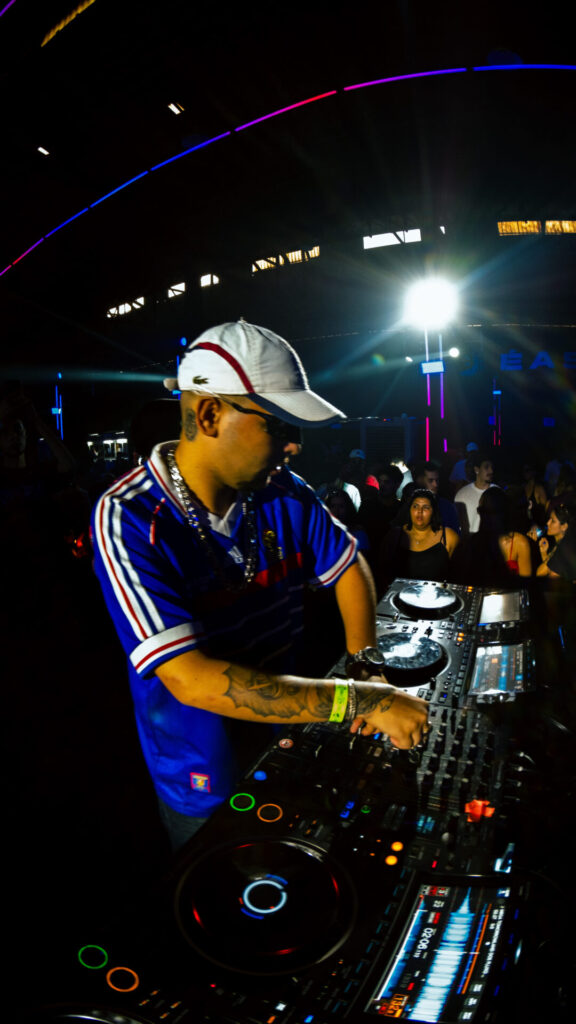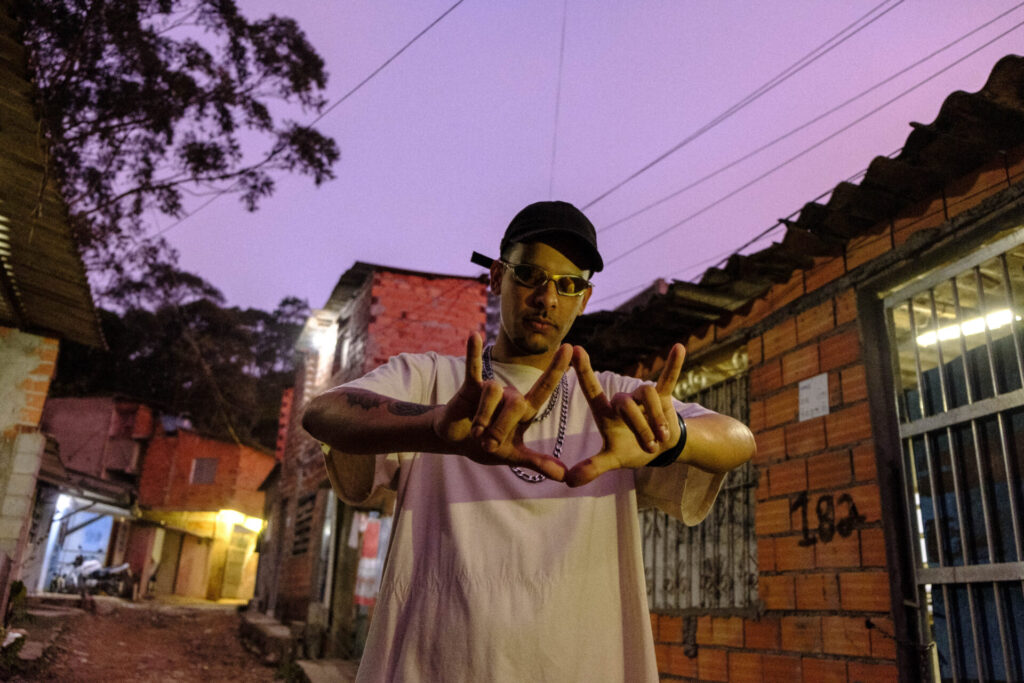It’s peak summer in Portugal, and winter in Brazil. Between Diademo on the outskirts of São Paulo and my gentrified European city, there’s not much we have in common beyond a shared language, a mutually recognised past, and the severance of the colonial link that forged a difference in how each of us speak Portuguese. And yet, we make it work – or, to be fair, K makes it work. This is not his first venture into northern territories, where he’s been gaining momentum with his brand of ‘bruxaria funk’ (witchcraft funk). His new album Rádio Libertadora is not born from the same sense of need and desperation that marked its predecessor. This time around it is a carefully crafted message, and indelible proof of his talent, reaffirming his status in the clubbing world with a singular, constantly-clipping, uber-intense use of the broken-beat Brazilian sound of baile funk.
Bruxaria spans from the mandelão subgenre of the favela sound. This variant of baile funk originated in São Paulo, more specifically in Bairro do Mandela, a neighbourhood that picked up on the frantic, kick heavy sound of Rio de Janeiro which is more closely related to its forefather, the Miami Bass instrumentals that made their way into the country in the late 90s and early 00s and ignited parties in favelas. Mandelão is more slow, stripped down and inebriated, making the use of the characteristic ‘tuin’ sound, a tinnitus-like frequency akin to an eardrum shutting down – or, in the Brazilian context, what one hears after inhaling the infamous drug ‘Lança Perfume’ (also the title of one the most famous hits by the nation’s rock and psych queen, the late Rita Lee). Mandelão often relies on various forms of tuin to make melodic lines, which K took to a whole new level on his debut Pânico no Submundo, using the high-pitched sound to imbue his tracks with a sense of horror, claustrophobia and paranoia.
DJ K tells me that his first album was never meant to be. “I wanted to give up on music,” he says. Nevertheless, a friend who was mediating a relationship with the Kampala-based label Nyege Nyege pushed him to keep going. “I was late on my rent, on my utility bills, leaving the house to work at 4am and getting back home at 8pm. I was done with it. I told him I was never producing again, I had to work, and my job as an assistant mechanic left me with little time and energy to think about music.” What changed his mind was an advanced fee wired to him from Uganda. “I accepted because I needed the money. I recorded the whole thing in three or four days on my mom’s laptop. I started producing at 8pm and finished at 10pm, the legal cutoff for noise in São Paulo.”
The result was the soundtrack of Héliopolis, the biggest favela in Brazil, where mandelão funk took hold and illegal bailes defied the mandatory curfews of far-right president Jair Bolsonaro, in office during the COVID-19 pandemic. “We were living through literal panic back then. I wanted to describe that feeling in my music.” Pânico no Submundo is an extreme version of the São Paulo strand of funk, tuin included, with the album cover’s creepy imagery of Pennywise-like clowns mirrored by samples of distressing laughs clinically sprinkled over the tracks. The whole setting was so bleak that one of K’s MCs, from inside a wardrobe, jokingly spat into a smartphone mic: “DJ K não está mais produzindo, está fazendo bruxaria” (DJ K is not producing anymore, he’s making witchcraft). K sent the voice track to his computer via WhatsApp and used it as a tagline, announcing his arrival in every song, as baile producers often do. Out of necessity a new genre had been created, out of need, deeply shaped by necessity, by those the welfare state had forsaken. No studios, no professional microphones, just Fruity Loops, MCs singing into iPhones from closets, and the sheer will to get it done.
Rádio Libertadora does not reverberate with quite the same terror as the first album. It’s the result of a more thoughtful approach to his craft. “I stopped everything for a full month to work on the record. I put time into thinking about each lyric, I talked with all the MCs about the message that I wanted to convey. The sound is more balanced, it is more structured.” Whereas Pânico no Submundo was a “scream of need and anger” to describe the chaos of living through a pandemic in the favelas of São Paulo, K’s new long player is more “conscious,” as he puts it. “It isn’t cheerful, but rather ideological and reflexive. I steer away from explicit political opinions, but I leave a neutral message for us to think about how we’re currently living. I pose questions, raise doubts. I want to make people ponder these things.” His goal was to paint a new picture, that of criminality and violence in the favelas. “For this record, my main focus wasn’t the beats, but rather the lyrics. I wanted to focus on what is happening in the favela, even if in our way of saying it, in mandelão-style. It is all about the chaos of the favela pushing people towards criminal lifestyles.
His political maturity – though undoubtedly shaped by the Portuguese language, where the terminology for both larger scale ‘politics’ and everyday ‘policy’ is compressed into the single concept of ‘política’ – is impossible to separate from his upbringing. Son of an evangelical pastor, he made his way into music through his elders, with his father playing music as well as his uncle who was into reggae, rock and hip hop. He claims to be ideological, not political, but during our conversation K brings up the way hip hop acts such as Racionais MC’s and Emicida, whose left-leaning conscious rap leaves no room for misinterpretation, influenced him growing up. K brings my attention to 500 years of colonial exploitation of the Brazilian territories and says that the “oppression is not over” when explaining the track ‘Sobrevive Contra o Estado’ (Survive Against The State). There are some safe assumptions one can make about his political inclinations, although he often steers the conversation into the more straightforward nuts and bolts of the writing process itself: “I do not want trouble with my family or friends. I have had enough arguments. There’s a huge schism here in Brazil around these questions.”
This is why DJ K goes subliminal and appropriates the funk archetypes to make his political claims. The album’s opener sets the tone with a sample from a clandestine radio transmission by the communist guerrilla leader Carlos Marighella in the late 1960s, around the beginning of the country’s military dictatorship, declaring that “the struggle has already started,” followed by a female broadcaster announcing that “the liberating radio [Rádio Libertadora] is live. Down with the military dictatorship”. MC Falcão then comes onto the scene to set the tone: “Vai! Vai! Não reage! Não é o governo que ‘tá falando, é K e o Falcão” (“Go! Go! Don’t react! This is not the government speaking, it’s K and Falcão”). In ideological terms, it’s clear what’s hinted at by this appeal against the reactionary. Calls for change are further explored in the use of baile funk tropes, while hyper-sexualised bars (the uniquely Brazilian use of language keeps on giving a thousand ways of mentioning genitalia – buceta, pente, jojoca, pau, et al), and hype calls typical of baile funk pave the way for more poignant messages.

In between party chants and all the mandelão-style lyrics, DJ K and his crew of MCs mention access to education, criticise the excess of violence in their community and the ever-growing presence of criminal networks in favelas (‘Troca Tiro e Faz Dinheiro’ literally means “exchange gunshots and make money”, while you can hear MC MN turning the gun glock into a verb ‘glockada’), and denounce the state for both oppressing and ignoring the working class. More specifically, they take aim at the insidious methods of state oppression thrown at his community, pointed out by K in a way that would make Michel Foucault proud. “Brazil is wonderful for those with money, but 80 per cent of the population lives on the basics, with no access to anything, to security, to healthcare. Surviving against the state is not only getting through the cops, it’s about surviving the lack of education, the lack of healthcare, and the excess of bureaucracy to get some crumbs.”
Since releasing Pânico no Submundo and breaking through into the northern hemisphere’s club scene, with European tours, festivals and a Boiler Room appearance under his belt, DJ K has been able to move out of his parents’ place and find an apartment for himself. He has his own studio, created his own label, Bruxaria Sound, and found himself with time to spare – something that had been lacking when creating his debut. As a result, “I was able to put forth what I wanted to say, together with my MCs. They have their ideas, so we got together to talk it through, they would write the bars and return later to record. I told them: ‘There’s no rush. We are doing this the way it is best for us.’”
Sonically, DJ K has pushed his witchcraft into even darker realms, pulling influences from mandelão as well as the funk carioca genre, with the more frantic rhythmic of Rio de Janeiro making way into tracks such as ‘A Tropa do K’ – before the tuin kicks in and swiftly shifts us back to the concrete-heavy topography of São Paulo. His explorations up north also rendered some aesthetic results: the beats in ‘Psy Vem Fazer Nenem’, ‘Sua Filha quer os D’, ‘Ali Perto da Imigrante’, and ‘Techno do Favelado’ are influenced by house, techno, and more bouncy-house genres of baile like megafunk. His bruxaria still keeps on pushing speakers to the limit, however. The single ‘Mega Suicidio Auditivo’ takes no longer than 20 seconds to reach a full-fledged face-melting kick and synth clipping beat, and even then it’s still able to double down on the insanity with a piercing tuin-turned-samba whistle. Tracks like ‘Sequencia de Beat Entorta’, ‘Ela Pega o Brinquedo Na Mão’, and ‘Troca Tira Faz Dinheiro’ maintain the sense of terrorising sonic warfare that made its predecessor such a standout, only this time it’s more polished.
Despite the progression in his sound, DJ K remains true to his original blueprint. “I still live in the favela, 10 or 15 minutes away from the baile. I still go there, just for fun’s sake. I play São Paulo, keep to the schedule, but for leisure, I always like to go back to where I’m from.” Until releasing his first album, K had never left the state of São Paulo, and admits he was afraid of going on tour when the first invitations to play abroad came up, but “favela spoke louder” as he told a national newspaper back in 2023. He had to go. Favela speaks volumes in his craft, something that becomes clear when he states his preference for the paredão – the wall of speakers often used in the favelas for bailes – a soundsystem constructed in perfect harmony with the aesthetics of the mandeão. “The paredão means total freedom to me. High decibels, the audience jumping, dancing, and vibing. There’s good energy in clubs, but there’s nothing like the favela. Even in Europe, people always told me the energy is different, but the people just don’t know how to be like us.”
In this case, the paredão is a perfect metaphor for DJ K’s music: heavily influenced by the concrete and tar of São Paulo, but breaking the rules with clipping beats, earthshaking kicks, and mind-bending high-pitched frequencies. Each song has a clear idea, but the beat travels through many different contexts, always with all knobs turned to 11.
DJ K’s new album Rádio Libertadora is released on 8 August via Nyege Nyege



